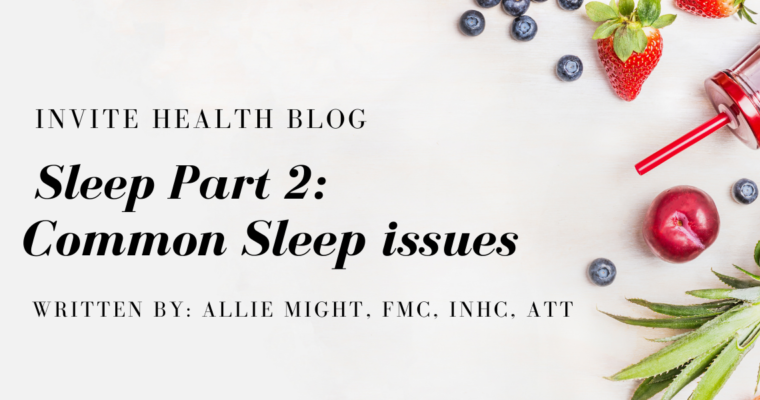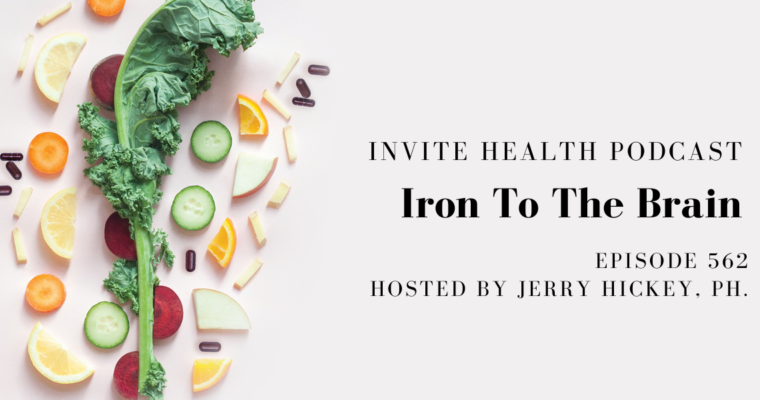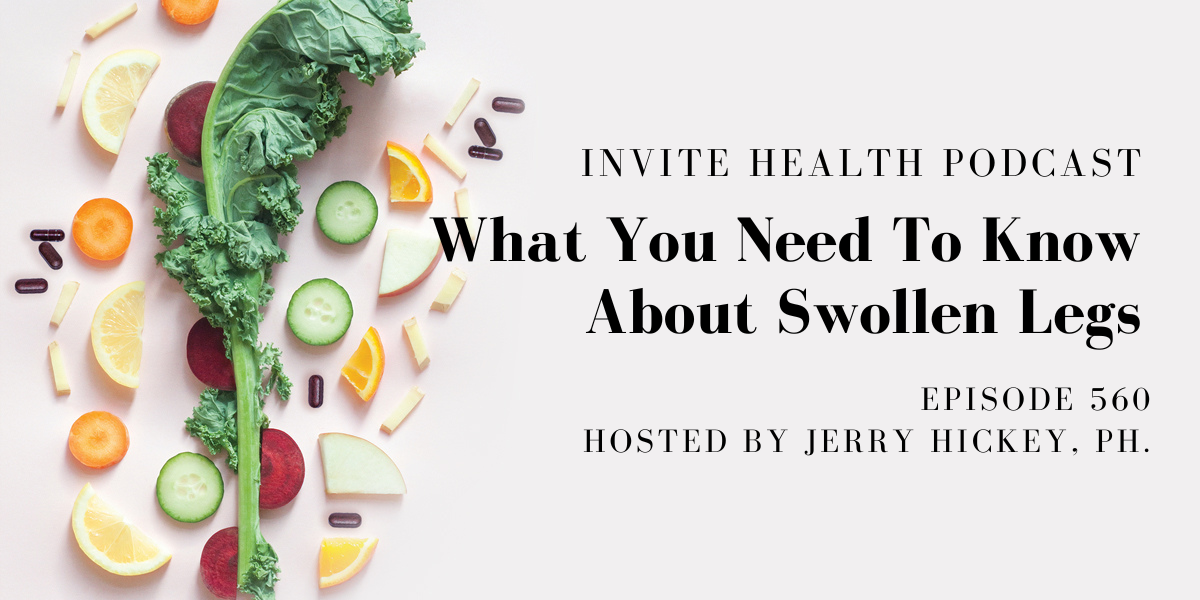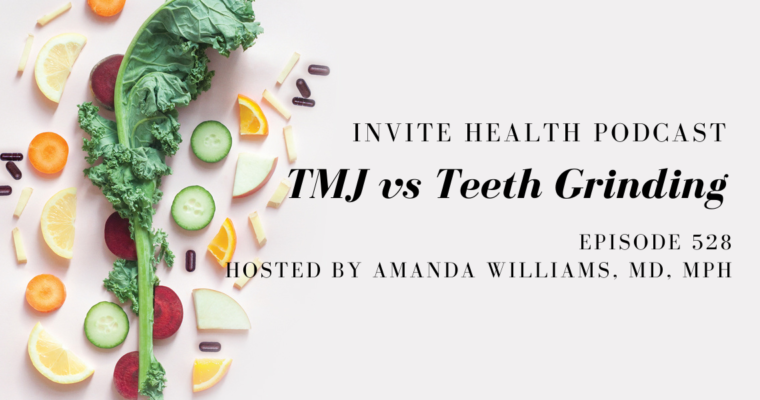swollen legs
Subscribe Today!
Please see below for a complete transcript of this episode.
What You Need To Know About Swollen Legs – InVite Health Podcast, Episode 560
Hosted by Jerry Hickey, Ph.
*Intro music*
InViteⓇ Health Podcast Intro: Welcome to the InViteⓇ Health Podcast, where our degreed healthcare professionals are excited to offer you the most important health and wellness information you need to make informed choices about your health. You can learn more about the products discussed in each of these episodes and all that InViteⓇ Health has to offer at www.invitehealth.com/podcast. First time customers can use promo code PODCAST at checkout for an additional 15% off your first purchase. Let’s get started!†
*Intro music*
Jerry Hickey, Ph.: [00:00:40] Do you experience painful cramps in your legs at night when you’re trying to sleep, or do you get these cramps if you walk uphill or if you walk too quickly or walk too far? Or do you have swelling in your legs and in your ankles and your calves? If so, you may have a condition called chronic venous insufficiency, and you really should see a doctor about it. Now chronic venous insufficiency may not be an immediate threat, but it really affects your quality of life. It really affects your mobility, your ability to exercise, your ability to get around and see your friends, etc. And it’s painful and disabling. † [00:01:19]
[00:01:21] So welcome to my episode, how to Help Your Swollen Legs. My name is Jerry Hickey, I’m a licensed pharmacist who specializes in nutrition. You can find all of the InViteⓇ podcast episodes for free wherever you listen to podcasts, or just go to invitehealth.com/podcasts. You can also find us on Instagram, Twitter and Facebook at InViteⓇ Health. And by the way, if you listen, please subscribe and leave us a review that would be helpful. In any event chronic venous insufficiency usually occurs in your legs. It can occur in your arms. It’s like it’s like it’s kind of like heart disease, but it’s in the legs. Now arteries take oxygen rich blood away from the lungs and heart and bring in an oxygen rich blood around the body. Once the oxygen is removed, your arteries are your biggest blood vessels, by the way. Once the oxygen is removed from the blood, it has to be returned to the lungs in the heart to pick up more oxygen that happens through the veins.† [00:02:24]
POOR CIRCULATION TO THE LEGS? THESE NUTRIENTS CAN HELP – INVITE HEALTH PODCAST, EPISODE 475 >> Listen Now!
[00:02:26] So the veins usually return the blood to the heart once it’s used. But you have to prevent the blood from flowing backwards, especially in the legs. They’re fighting gravity. So valves close behind the blood. And sure enough, the blood flows up, back up towards your heart and lungs and chronic venous insufficiency. The valves don’t allow the blood to fall back up to the heart adequately. And in fact, some of the blood can actually flow backwards and pool in your legs. So you get the swelling of the legs or the calves of the feet of the ankles. You get leg cramps because these are the symptoms from the pooling blood, the poor circulation. You get the leg cramps, charley horses. You can also get leg cramps at night when you’re trying to sleep. You have pain, pain, painful cramps if you walk too fast or you’re putting too much stress on the muscles in the legs. The reason for that is the leg muscles are not getting enough blood. So lactic acid builds up as an alternate source of fuel, but the lactic acid can lead to cramping and pain. So you have to sit down until the acid clears out of the muscles and circulatory system before you can walk again, because that lets the cramps go away. It can also lead to damage to the skin and discoloration of the skin, like the skin could turn much darker in that spot. You could develop varicose veins to bulging veins, you could get leg ulcers and the problem is there’s poor circulation, so the immune system and healing won’t take place properly. So you can wind up with serious infections. You also get itching in the legs. Restless leg syndrome, that’s not nice restless leg syndrome or these vague growing pains you get in your legs when you’re trying to sleep and you have to move your legs to get comfortable. And you can lose hours of sleep every night. But you could also have the intermittent qualification, which is the pain, the painful cramps, the painful muscles you get if you try to walk too quickly. † [00:04:28]
[00:04:29] So what are the regular treatments? Will elevate the legs that can help, compression stockings. Compression stockings a lot of people call them surgical stockings or surgical support holes. They can be hot and itchy and people don’t tend to like them. Diuretics, that’s for the swelling to get rid of the excess of fluid, blood thinners to prevent blood clots if there’s a risk. And then Trento that’s pentoxigylline, that’s the generic name of Trento that helps treat leg ulcers by improving blood vessel function and blood vessel flow in the legs. But it also may help prevent blood clots and it’s commonly used. But then there’s invasive procedures like ablation therapy or surgery. So what are some of the causes? Um, the most common cause is obesity and overweight. There was a study done mostly men would chronic venous insufficiency, and they really found a strong correlation between chronic venous. † [00:05:34]
[00:05:34] Insufficiency and being overweight and being older. So if you’re overweight for a long time and you’re older, you have a higher risk of chronic venous insufficiency. Also, if you’ve had damage to the leg like a like an injury, a severe injury, or you had previous blood clots of the legs like deep vein thrombosis. If you smoke, that’s a common cause or if you have phlebitis, phlebitis is inflammation of the veins. So if you have in this case, if you have phlebitis in the legs, it can lead to chronic venous insufficiency. So what can we help you with now? Obviously, getting exercise, not smoking, losing weight, eating your vegetables, and all of those are all going to be good things. But horse chestnut, horse chestnut technically is called Aesculus hippocastanum. It’s a tree, it’s a chestnut tree that grows in southeastern Europe. So over by the Balkans, the Balkans would be like Bulgaria, Macedonia, Greece, Albania, parts of Italy, parts of Turkey. You know that region around there. And a seat at a horse chestnut tree is high in aescin and that improves circulation in your legs and has been proven to help with intimate claudication in humans. It helps with the cramps, with the swelling. You’ll see the fluid draining out of your legs, in front of your eyes, practically the itching, all those symptoms, even even the cramps you get at night, by the way, because it helps veins, it can help varicose veins, but it can also help hemorrhoids, which is basically a swollen vein. So it helps other things, too. And it helps varicocele, the problem with a vein and the testicles fo men. So there are other uses for the horse chestnut, but all related to the age. So it has a circulatory effect. Now, it’s been used for centuries. The active ingredient is aescin, which is an anti-inflammatory, but it also affects specific receptor sites for the neurotransmitter serotonin. This helps the veins work better and it has a mild antiplatelet effect and helps the blood flow better. So let’s look at some of the studies.† [00:07:55]

[00:07:56] So once again, it’s called horse chestnut, horse chestnut seed extract. There’s been quite a few studies on at this point. The Department of Vascular Medicine at the University of Heidelberg, that’s in Germany, published a study in The Lancet. And their first study, they found that horse chestnut seed extract, reduced leg swelling. And it improved the symptoms of people of chronic venous insufficiency. So the swelling of the legs went away in the ankles and improved their mobility. They were able to walk more comfortably further so they had a better life. But then they did a bigger study later on, like four years later. University of Heidelberg in Germany. The Department of Vascular Medicine. And over a 12 week period, horse chestnut taking over twice a day, horse chestnut seed extract high in aescin reduced the leg swelling better than the surgical stockings, you know, the mechanical support hose. It was slightly better than mechanical support hose and it was very safe. And they found that there was a continued reduction of the swelling. You know, once you take off the mechanical support hose, the swelling is still there, whereas the horse chestnut was getting rid of the swelling. It really had an effect. So Munich Maximilian University is in Munich, Germany, and they analyzed a large group of study 16 human clinical trials, which included almost 11,000 patients with chronic venous insufficiency. And they found that horse chestnut seed extract. Yes, it was reducing swelling in people of chronic venous insufficiency. It was reducing the leg pain. It was improving their walking ability, all the things you want to see. And once again, it was safe. † [00:09:49]
[00:09:51] So the University of Exeter is in the UK, it’s in England. And they did another review of studies independently of the German researchers, and they came to the same conclusion. Horse chestnut seed extract reduce swelling in the feet, reduce swelling in the ankles, and the calves the entire leg. It reduced leg pain, the drug pains and reduced itching, it reduced leg fatigue, it improved leg fatigue because people get this with leg fatigue. It was safe and once again, it worked as well as surgical stockings. Now, if you’re going to do, if you have chronic venous insufficiency and you’re going to try a product to help and you want to try horse chestnut to extract, as long as you are not super thinning your blood, it’s it should be very safe to use. It does thin the blood a tiny, tiny, tiny, tiny bit. So if you can get the horse chestnut seed extract, it’ll help a lot, but get a product that also includes flavonoids. They used to be called bio flavonoids and vitamin C, because the bio flavonoids in vitamin C are important for the integrity of the blood vessel walls, to make the blood vessel walls heal and healthy and they keep them clean. Like a good source would be bilberry, Bilberry is also called whortleberry. That’s a northern European relative of blueberry except it is stronger.† [00:11:18]
[00:11:21] You might want to look at gotu kola which is also called centella asiatica. It’s been shown to help with circulation in the legs. So there are other things you can add to the horse chestnut that should make it more effective. And it wouldn’t hurt to get a little silica, silica support for the structure of the blood vessel walls. It’s a mineral a small amount is used for making these blood vessel walls. So all of these things are good to use along with the horse chestnut seed extract for chronic venous insufficiency.† [00:11:50]
[00:11:51] Now let’s talk a little bit about restless leg syndrome. There is some evidence that that’s related to low levels of iron affecting in the back of the brain where dopamine is produced. Dopamine is a nerve transmembrane in the brain. In back of the brain that’s important for mobility and muscle function, etc. And there is some evidence that lacking iron is may be somewhat causative of that. On the other hand, people with chronic venous insufficiency commonly have symptoms similar to restless leg syndrome. And basically what it is, you wake up during the night and you have these drawing these weird drawing pains and you just can’t get comfortable and you just have to keep on moving your legs and elevate your legs. And I’ve had a number of clients where I’ve given horse chestnut seed extract in preparations with other herbs and nutrients, and it’s really helped them with Restless Leg Syndrome, and it’s really helped him with chronic venous insufficiency where they had these swollen legs.† [00:12:47]
NATURAL HELP FOR RESTLESS LEGS SYNDROME – INVITE HEALTH PODCAST, EPISODE 379 >> Listen Now!
[00:12:48] So I want to thank you for listening to this episode of the InViteⓇ Health Podcast. You can find all of our episodes for free wherever you listen to podcasts, or you can go to invitehealth.com/podcast So please leave a review and please subscribe. You can also listen to us on Twitter and Instagram and Facebook at InViteⓇ Health. Thanks for listening this is Jerry Hickey signing off and I hope to see you next time. On the next episode of the InViteⓇ Health Podcast. † [00:12:48]
*Exit Music*








